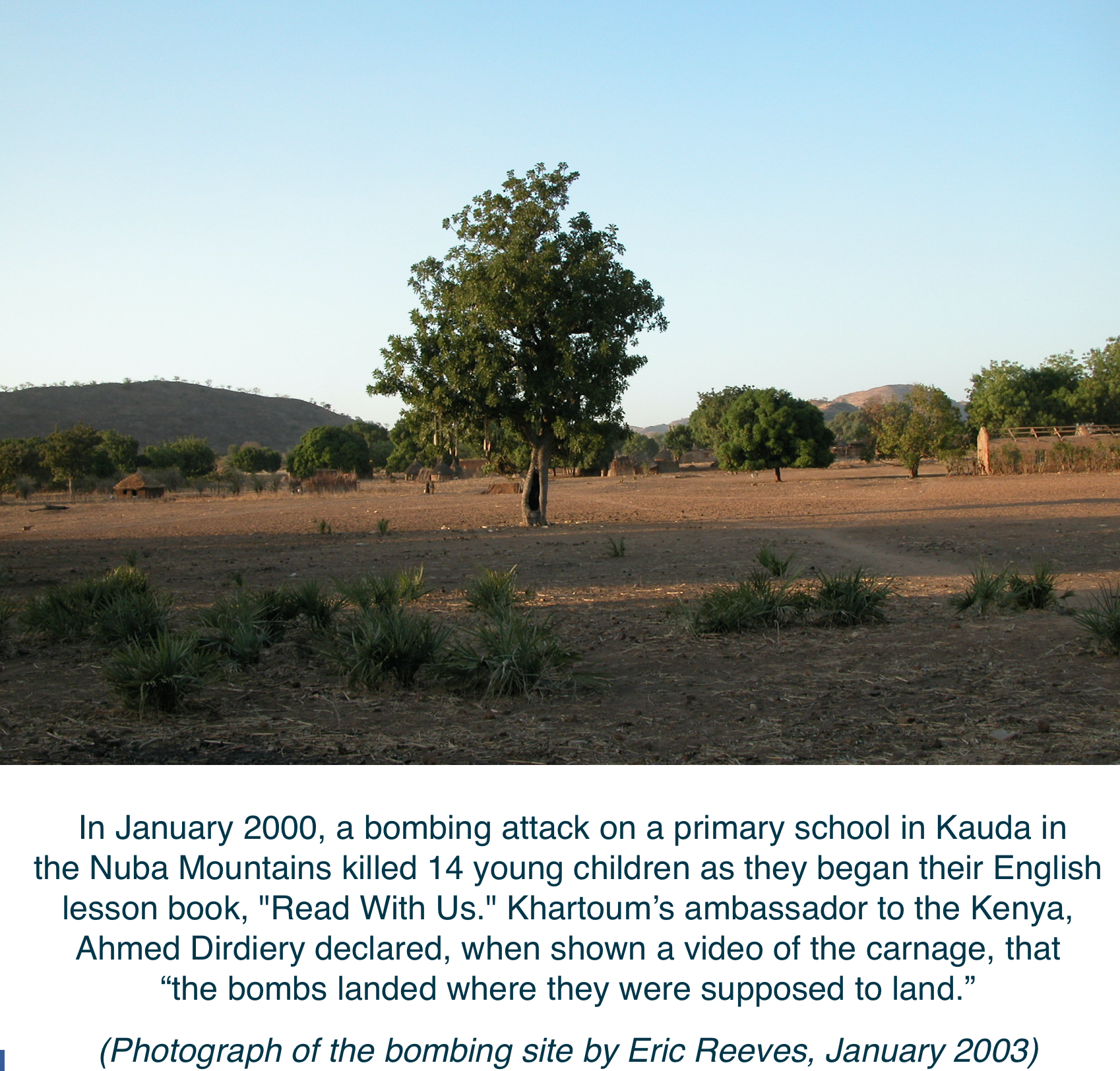The Challenge of Peace in the Nuba Mountains
Eric Reeves, Fellow, Rift Valley Institute
September 1, 2020
When I was in the Nuba Mountains in January 2003—shortly after the October 2002 cessation of hostilities agreement between a then-united Sudan People’s Liberation Movement/Army and the Khartoum regime of Omar al-Bashir—memories of the nearly successful genocidal effort to exterminate the Nuba people in the 1990s were still all too fresh. This was of course before the campaign resumed in June 2011—and continues in one form or another today.
I was asked by a very large group of top civilian and military leaders to come to a meeting at Kwere, above the town of Kauda, which lies in the Kauda valley in the center of the Nuba Mountains. It had been and would become again, a prime target of indiscriminate aerial assault by Sudan Armed Forces planes, mainly Antonov bombers, but sometimes advanced fighter aircraft. The Mother of Mercy hospital near Kauda has been attacked multiple times since the resumption of fighting in 2011.
Kwere is at the top of an extremely challenging rocky road, and serves as an extraordinary redoubt. It is also where the mausoleum of Yusef Kuwa Mekki is located, and I had a chance to pay my respects to this extraordinary man and universally respected leader of the Nuba.
During a two-hour meeting under a tent that had somehow been miraculously procured for the occasion, around rough tables, I sat and listened as the leaders spoke. I asked an occasional question, but my purpose there was clear: I was to listen and bear witness to the determination of the Nuba people. And such determination I have never in my life encountered: it was by far the most moving and significant time of my travels in Sudan/South Sudan that month. Indeed, it was one of the most extraordinary experiences of my entire life.
Again and again, I heard—in tones of ferocious and angry insistence—what I distill here:
That having been left out of deliberations preceding independence in 1956; having been effectively left out of meaningful provisions of the 1972 Addis Ababa agreement that ended the first North/South civil; the people of the Nuba Mountains would not be left out again in the looming talks that would produce the peace agreement at Naivasha in 2005. It was imperative, I was told again and again—by civilians and military leaders, women and men—that they would not be left out this time!
And yet of course the Comprehensive Peace Agreement of 2005 did leave them out, granting them only the most meager substitute for what had been demanded: meaningless “popular consultations” that left the Nuba Mountains as part Sudan. It would be felt as a deep betrayal on the part of the leadership of the SPLA/M. It has been argued that in the interests of the larger peace agreement, the Nuba Mountains (and Blue Nile) had to be sacrificed. Perhaps. This isn’t, however, the moment to attempt a synopsis of the complicated history of the Naivasha negotiations, or what more meaningful and sympathetic international intervention might have been able to achieve.
I write now only to give context to the refusal of the widely respected Abdel Aziz al-Hilu—current leader of the Sudan People’s Liberation Movement/Army-North (al-Hilu faction)—to be a signatory to the peace agreement signed in Juba between the Khartoum government and most rebel groups from Darfur and Blue Nile.
Abdel Aziz is known to me as a man of extraordinary integrity, tremendous courage, and the clearest intelligence. Those who expect the people of the Nuba to accept being abandoned again—as was effectively done in 1956, 1972, and again in 2005—do not know either Abdel Aziz or the people of the Nuba. I will not attempt to suggest what a reasonable resolution of the demands Abdel Aziz has repeatedly made on behalf of the people of the Nuba—and all of Sudan, for that matter; they are not trivial, however, and they are not meant to be obstructionist. He and the people of the Nuba wish for Khartoum to address the root cause of decades of war, the removal of an extremely repressive sharia, and a decentralization of power.
The weaknesses of the August 2019 “Constitutional Declaration” are also now obvious to all, with far too much executive and economic power in the hands of the military and security forces—and the commander of the Rapid Support Forces, Hamdan Dagalo (“Hemeti”). Hemeti and the RSF are responsible for a great deal of recent violence against civilians in South Kordofan as well as in Darfur. Unless there is a new constitution before elections, guaranteeing a legitimate interim government, these weaknesses will destroy the possibility of real civilian governance.
From my experience, I cannot see how peace will come Sudan until the aspirations of the Nuba people have been recognized, their historic grievances accepted as defining the context in which they will negotiate through Abdel Aziz, who has proved to be both a powerful unifying figure for the Nuba, and a military leader of legendary skill and resilience.
I have looked into the eyes of these people, I have felt the intensity of their experiences at close quarters, I have heard their overwhelming commitment to achieve some meaningful form of self-determination. Absent this, peace will not be “comprehensive” in Sudan.
